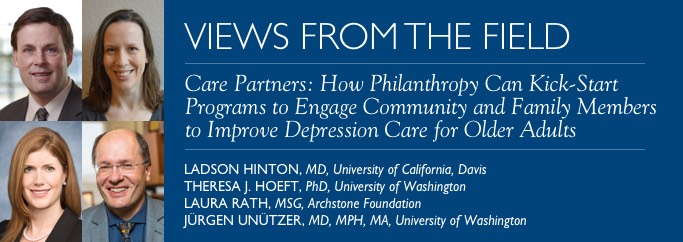
Late-life depression is a pressing public health concern among an aging population facing increasing chronic health concerns. As many as 5 to 10 percent of older adults seen in a primary care health setting suffer from depression, which can last for months or even years, and is associated with both decreased quality of life and higher health care costs. Unfortunately, stigma around mental health conditions and misunderstandings of depression in late life that view depressive symptoms as “understandable” and “justifiable” can jeopardize older adults’ access to appropriate care.
Advancing Services and Interventions for Late Life Depression
Fortunately, there are programs that can help. Collaborative care is an evidence-based model that treats depression in primary care, where older adults are most comfortable receiving health care, using a team approach. The model has proven to be effective through more than 80 randomized controlled trials. The traditional collaborative care team includes the patient’s primary care provider, a psychiatric consultant, and a care manager, a team of professionals that regularly follows-up with the patient, monitors depression symptoms, and customizes treatments until depressive symptoms improve.
If these effective models of care are implemented more broadly, they will most certainly improve access to care and broaden the reach of the specialty mental health care workforce for older adults with depression and other mental health problems. The good news is that this progress will be hastened by the January 2017 release of Centers for Medicare/Medicaid (CMS) billing codes to support collaborative care, which will support dissemination of collaborative care in primary care clinics.
Some older adults suffering from depression, however, may be hard to reach, reluctant to seek help, and socially isolated. Community outreach efforts to engage older adults in care, through outreach workers and family members of older adults, therefore offer a promising opportunity to enhance depression care. As the U.S. health care system moves toward accountable care programs that include services outside traditional health care settings, increased attention has been given to linking community services with clinic-based health care systems to improve care for high-need and socially at risk populations, which will help. Including family members of older adults as part of the depression treatment team is another promising approach to advance care and access for vulnerable populations.
Testing a New Model of Collaborative Care: the Care Partners Project
To improve collaboration between clinic-based health care systems and community-based organizations serving older adults, Archstone Foundation launched a learning collaborative in partnership with researchers at the University of Washington (UW) and University of California Davis (UCD) in 2014 called the Care Partners project. The goal of this learning collaborative is to support enhanced collaborative care programs developed through partnerships between primary care clinics and community-based organizations and/or family care partners caring for depressed older adults. Researchers from UW and UCD work closely with the goals of the foundation to offer ongoing technical assistance to sites on collaborative care and ways to integrate family in care. UW and UCD researchers also offered overall program evaluation of the participating sites’ programs and the developing learning community across sites.
Grantmakers as Community Catalysts to Improve Depression Care for Older Adults
Early evaluation results of the Care Partners project show promise that engaging community-based organizations, like senior centers, and family members as part of the care team can greatly help in engaging depressed older adults in care and reducing their depressive symptoms. We believe that grantmakers across the country can invest in improving depression care for older adults by:
- supporting dissemination of collaborative care for depression in primary care health settings;
- fostering similar collaborations that involve community-based organizations and/or family members in depression care for older adults; and
- ensuring that health care settings incorporate case management across community and clinic settings to further encourage linkages between clinics and community agencies.
Depression is not a normal part of aging. Health care providers need to implement comprehensive systems to recognize and treat depression, and integrating depression care into the primary care setting can be particularly effective because that is where older adults are already comfortable receiving care. Similarly, systematically engaging community-based organizations and/or family members into the care team shows promise for reducing depression and improving the quality of life of older adults. By supporting this work in their communities, grantmakers can help reduce health care costs and, most importantly, improve the lives of older adults suffering from depression.

